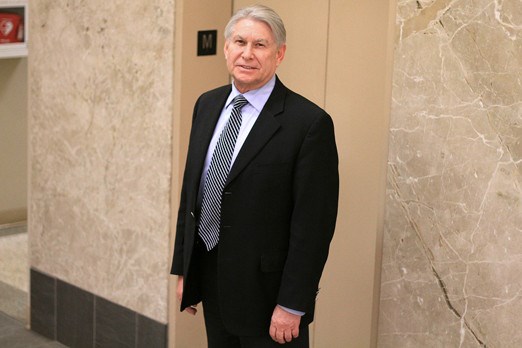If Mayor Keith Hobbs and Coun. Ken Boshcoff have their way, the public will know a lot more about what goes on behind closed doors.
Both elected officials are leading the push to bring transparency to city hall, though burdened with the legal requirements of the Ontario Municipal Act, it remains unclear how much city council can bring into open session.
“I have a concern with how many times we’re going into in-camera meetings,” said Hobbs on Tuesday, hours before entering a closed-door session of council called to discuss the matter of transparency and accountability at city hall.
“The Municipal Act states that you may go in-camera, but it doesn’t say you have to go in-camera. So we need to explore this. Whenever possible we need to be public with issues. I realize that some legal issues you have to go in-camera. There are very sensitive matters that are talked about. So we have to respect that.
“However, the public needs to know the decisions that are made. I think the wind farm is a prime example of one where we could have done things better.”
In 2007 council agreed to lease a piece of land to the south of the Big Thunder Nordic Park, but when the province scuttled the plan the lease was redone to allow Horizon Wind Inc. to build up to 18 turbines on the Nor’Wester Mountain Range.
Council spent much of the last year debating the issue, much of the discussion happening behind closed doors, and ultimately decided to only approve 14 of the 18 turbine locations.
That led Horizon to file a $126-million lawsuit against the city, in part for breach of contract.
Under terms of the Municipal Act, municipal councils, boards and committees must meet in open session. There are strict rules governing when they can go in-camera, a term derived for the Latin words meaning in private.
Among the allowances is the discussion of the security of property belonging to the city or board, personal matters about an identifiable individual, land acquisition or disposition, labour relations or employee negotiations, litigation or potential litigation and advice subject to solicitor-client privilege.
They can go behind closed doors for educational or training sessions.
As of Jan. 1, 2008, Ontario cities were required to appoint a closed-session investigator – in Thunder Bay’s case Paul Heayn – to deal with complaints from the public who disagree with council going into closed session.
Boschoff said in his eight years away from the council table, litigation against the city has grown exponentially, and he understands why so many matters must be dealt with away from the public. It doesn’t mean he’s happy with it.
“I think there’s a general feeling on council that they’d like to find a way of letting the public know as much as possible what they’re talking about,” he said.
While Hobbs would like to see meetings shortened to three hours or less and more discussion in council chambers, Boshcoff said at the very least he’d like to announce what they’re going behind closed doors to talk about.
While it won’t satisfy everyone’s curiosity, it might satisfy the public’s need to know without contravening provincial law.
“It would let the public know that these issues are of public concern. The difficulty is if you’re too open about it, it jeopardizes the city’s position in court,” Boshcoff said. “I know that everybody on council wants to find a way to be more transparent.”
But can it be done?
Boshcoff thinks it can, as long as everyone on council knows what to say and what not to say.
“There would be the probable requirement that members of council not blurt out ‘I think we’re innocent,” or something like that. It would have to be something that everybody could agree upon.”
Hobbs said it’s not lost on him that his first council meeting as mayor began with a two-hour in-camera session, while various committee members were chosen.
Those are the types of things that could be done in open session, he suggested.
“We may want to look at going public with that. I don’t think it was such a necessity to go in-camera with some of those things. I’d like to cut down meeting (lengths) period,” he said.
Boshcoff, however, said the danger with selecting committee members is that a councillor might not be inclined to reveal information about a person with the public listening, for legal reasons.
Sign in or register
- Messages
- Post a Listing
- Your Listings
- Your Profile
- Your Subscriptions
- Your Likes
- Your Business
- Support Local News
- Payment History
Registered Users
Already have an account?
New Users
Create a free account.
